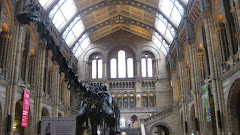Today, the concept of each of us having a “dark side” is so common that I have a hard time appreciating the novelty of this view of human nature, just as the “surprise” ending of The Strange Case of Dr. Jekyll and Mr. Hyde is lost on a modern reader, since even the phrase “Jekyll and Hyde” is now part of everyday language. But to late-nineteenth century Londoners, the story of a respectable, rational, modern man with a bestial, evil alter ego struck some new chord in their understanding of humankind, and this story has remained a part of our consciousness ever since. The idea of alter egos, of different parts of one’s “self,” seems like a uniquely urban phenomenon—perhaps the anonymity within a city allows people to reinvent themselves in ways they could not in a small village. Or perhaps the appearance of Mr. Hyde in the British psyche has more to do with chronology than urbanity. Earlier in the nineteenth century, a “dark side” was simply sin or moral laxity. By the end of the nineteenth century, though, science was usurping religion in many areas, including ideas about morality. Humanity’s bestial origins, as revealed by human evolution, accounted for the evil tendencies that Dr. Jekyll attempts to suppress, and Mr. Hyde’s “ape-like” and “deformed” aspect suggests he is a lower order. “Our descent, then, is the origin of our evil passions!” Darwin wrote. “The Devil under form of Baboon is our grandfather!”


On a side note, I’d like to mention John Addington Symonds, a friend of Robert Louis Stevenson and a sort of Victorian gay rights activist. Here is the first paragraph of his letter to Stevenson after reading Dr. Jekyll and Mr. Hyde:
At last I have read Dr. Jekyll. It makes me wonder whether a man has the right to scrutinize the “abysmal depths of personality.” It is indeed a dreadful book, most dreadful because of a certain moral callousness, a want of sympathy, a shutting out of hope. The art is burning and intense….As a piece of literary work, this seems to me the finest you have done…But it has left such a deeply painful impression on my heart that I do not know how I am ever to turn to it again.
I can’t help but wonder how much Addington associated Hyde with forbidden, homosexual desire; in this light, his opening seems like a deeply touching plea for understanding. Learning a little about Addington’s attempts to normalize gay culture in the late Victorian era (as by writing about homosexuality in the classical world) also makes me wonder how Victorians perceived homosexuality—as moral perversion or medical problem?

(
Click here to read Addington’s entire letter .)

 (Click here to read Addington’s entire letter .)
(Click here to read Addington’s entire letter .)
No comments:
Post a Comment